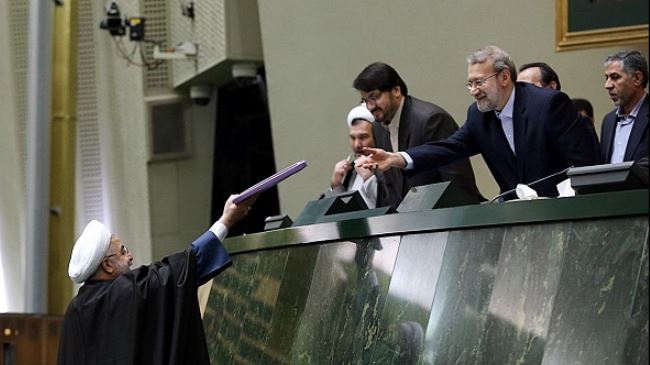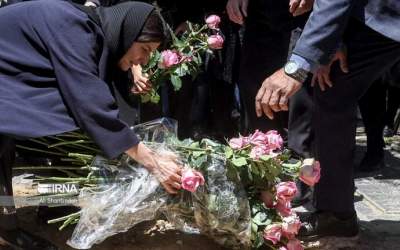 Iranian President Hassan Rouhani (L) submits the draft budget for the next Iranian fiscal year to Majlis Speaker Ali Larijani on December 7, 2014.[/caption]
Iranian President Hassan Rouhani (L) submits the draft budget for the next Iranian fiscal year to Majlis Speaker Ali Larijani on December 7, 2014.[/caption]Tehran, March 3, The Iran Project - "Iran's 1394 budget would be under pressure," this is what President Rouhani acknowledged when he elaborated the details of the budget bill for the next Iranian fiscal year (beginning March 21) before the country�s parliament (Majlis) three months ago, adding that "the government had been cautious in its forecasts."� Rouhani remarks in Majlis raised an important question: Where do these uncertainties come from?
Iran nuclear talks & sharp decline in oil prices
The unprecedented drop in oil prices in recent months, from above $100 to less than $50 per barrel, and the uncertain future of Iran nuclear talks seem convincing reasons why the government had to project the national budget by considering a variety of possible scenarios in nuclear negotiations and oil prices.
Although according to the president and some other economic experts, the decrease in the oil revenues would accelerate the move toward the non-oil exports, what would be potential consequences of this deficit? With assuming the oil price of US $72 per barrel in the 1394 budget bill, oil revenues will account for just 33 percent of the proposed national budget, compared with 50 percent in the previous year. This inevitable loss of oil revenues as the result of such plunge makes a huge hole and the government has to manage to bridge it through some measures which are as follows:
Tax Increase and Cost Cutting plans; A Contractionary Fiscal Budget policy
The Value Added Tax (VAT), with 2% increase from current 8% to 10% is anticipated in the budget bill in order to seek a new source of income to make up for part of the deficits resulted from falling the oil price. Based on the presented bill, tax income has been scheduled to be 725 billion rials (about $21.6 million) and is hoped to contribute 22 percent to the projected revenues.[1]
To raise 27 percent of the budgeted revenues from privatization is another proposed way to compensate the deficits.
In addition to raising the consumption tax, engagement in a major cost-cutting approach across many areas is another solution to deal with the revenue deficit in the 94 budget.[2]
The planned decrease in the total spending by 8-10%, the fall in budgets for some social programs, except for health and medical treatment, the raise in the rates of gas oil, natural gas, electricity and water are among the government's tool to produce a balanced budget.[3]
Considering a 20% inflation rate, the subsidies for housing, education, food, fuel and some other items have also been reduced.
Furthermore, the government has allocated an expense of 156 trillion rials ($5.5 billion) for monthly cash payments within the subsidy reforms, a 26% decline compared with�the 1393 budget bill. While the monthly cash amount per household would remain unchanged, it is expected that the government will introduce the third phase of fuel price hikes in 2015.[4]
The Outcome of Austerity and the Government's Denial
�Significant cuts to social and subsidy programs, devaluation of the national currency, and regressive taxations describe the austerity policies that the government may apply to combat the chronic deficits in the proposed budget framework of 1394.[5]
Despite the numerous indications, both the government officials and Majlis members seem to avoid admitting it and continue to prepare a budget plan whose main victim is the poor and the middle income people. This damage is due to the fact that the subsidies reduction of the fuel and food will be inflationary and lead to a rise in price of commodities in the Iranian households' basket.
Thus, the vulnerable households are undoubtedly the biggest losers of the austerity policies and they are the ones who have to shoulder the tax burden.
Given to the vast consequences of the austerity's impact, it remains to be seen to what extent the nuclear deal potential success and the subsequent release of the blocked Iran's assets may improve the welfare of affected population as the result of such austerity budget policy.
.......................................................................................................
[1] ISNA
[2] Al- Monitor
[3] Ghatreh
[4] Press TV
[5] Taadol News











